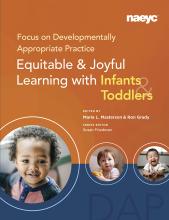Focus on Developmentally Appropriate Practice: Equitable and Joyful Learning with Infants and Toddlers

About the Book
-
Building a community where everyone is welcomed and supported to grow
-
Facilitating reciprocal partnerships with families
-
Observing, assessing, and documenting children’s development and learning
-
Using teaching strategies that enhance learning for each child
-
Implementing curriculum tied to meaningful learning goals
-
Demonstrating professionalism
-
More about what each guideline means for working with infants and toddlers and their families
-
Chapters that showcase articles from Young Children and NAEYC book excerpts—plus brand-new content—illustrating excellent teaching strategies related to each guideline
-
Examples you can model, adapt, and implement in your own practice
Table of Contents
- About the Editors
- Focus on Developmentally Appropriate Practice: Equitable and Joyful Learning Book Series
- Developmentally Appropriate Practice: An Introduction
- Developmentally Appropriate Practice with Infants and Toddlers
-
Part 1: Creating a Caring, Equitable Community of Learners
- Chapter 1: Caring Relationships: The Heart of Early Brain Development | J. Ronald Lally and Peter L. Mangione
- Chapter 2: Care and Equity in Toddler Classrooms: Practices for Creating, Sustaining, and Empowering Community | Nana E. Appiah-Korang and Abigail P. Gulden
- Chapter 3: Cultivating Positive Relationships and Physical Environments to Support Emotional Well-Being | Iheoma U. Iruka
- Chapter 4: The First Step for Addressing Bias in Infant and Toddler Programs | Sarah MacLaughlin
-
Part 2: Engaging in Reciprocal Partnerships with Families and Fostering Community Connections
- Chapter 5: Creating Partnerships to Support Families of Infants and Toddlers | Kelly Ramsey
- Chapter 6: Engaging with Families to Individualize Teaching | Marie L. Masterson
- Chapter 7: Facilitating a Child’s Transition from Home to Program Through the Use of Cultural Caring Routines | Josephine Ahmadein
- Chapter 8: Speaking Out: Supporting Families in Advocacy | Kristen Johnson and Amanda Perez
-
Part 3: Observing, Documenting, and Assessing Children’s Development and Learning
- Chapter 9: Bringing Observation and Documentation to Life in Infant and Toddler Settings | Rebecca Parlakian
- Chapter 10: Observation and Documentation: Both Art and Science | Malori‑Naomi Wallace‑Wyche
- Chapter 11: Using a Child-Centered Approach to Shift from a Deficit Mindset | Julia Luckenbill, Aarti Subramaniam, and Janet Thompson
- Chapter 12: Empowering Infants’ and Toddlers’ Learning Through Scaffolding | Linda Groves Gillespie and Jan D. Greenberg
- Chapter 13: What Babies Ask of Us: Contexts to Support Learning About Self and Other | Mary Jane Maguire-Fong
-
Part 4: Teaching to Enhance Each Child’s Development and Learning
- Chapter 14: What to Teach Before Talking: Developing Communication Skills Across Home and Early Learning Contexts | Mollie Romano, Jennifer A. Brown, Christan Coogle, Jennifer R. Ottley, and Emily M. Rose
- Chapter 15: The Power of Pause: Moments of Silence and Early Emotional and Language Development | Nodelyn Abayan
- Chapter 16: Strengthening Infant and Toddler Teaching with Explicit Language Skills | Allyson Dean and Linda Groves Gillespie
- Chapter 17: “You’re Okay” May Not Be Okay: Using Emotion Language to Promote Toddlers’ Social and Emotional Development | Elizabeth K. King
- Chapter 18: We Put Paper on the Floor: Supporting the Emergent Literacy Skills of Infants and Toddlers | Dilshad Tolliver
-
Part 5: Planning and Implementing an Engaging Curriculum to Achieve Meaningful Goals
- Chapter 19: Curriculum Considerations for Multilingual Infants and Toddlers | Irasema Salinas-González, Iliana Alanís, and María G. Arreguín
- Chapter 20: When in Doubt, Reach Out: Teaming Strategies for Inclusive Settings | Christine M. Spence, Deserai Miller, Catherine Corr, Rosa Milagros Santos, and Brandie Bentley
- Chapter 21: Exploring Outdoors: First Learning Experiences in Nature | Mary Benson McMullen and Dylan Brody
- Chapter 22: Using the Environment and Materials as Curriculum for Promoting Exploration of Cause and Effect | Guadalupe Rivas Jer
- Chapter 23: Infant and Toddler STEAM: Supporting Interdisciplinary Experiences with Our Youngest Learners | Eric Bucher and Stephanie Pindra
-
Part 6: Demonstrating Professionalism as an Early Childhood Educator
- Chapter 24: Nurturing Your Professional Appetite: Preparing Your Professional Development Path | Christy Brown‑John
- Chapter 25: Creating Learning Stories in the Context of Inquiry Groups | Isauro M. Escamilla, Linda R. Kroll, Daniel R. Meier, and Annie White
- Chapter 26: Thinking of Yourself as a Professional | Nicole Lazarte
- Chapter 27: Advocacy in Action: Stepping Up to Make an Impact | Maria Estlund
- Index
References
Additional Material
Book Details
ISBN: 978-1-952331-28-2
Publish Date: 2024
Related Resources
Articles
Marie Masterson, PhD, is the director of quality assessment at the McCormick Center for Early Childhood Leadership at National Louis University, where she oversees evaluation for ExceleRate Illinois. She holds a doctorate in early childhood education, is a licensed teacher, and is a national speaker and author of many books and articles that address research-based, practical skills for high-quality teaching, behavior guidance, quality improvement, and leadership. She is a contributing editor of Developmentally Appropriate Practice in Early Childhood Programs Serving Children from Birth Through Age 8, fourth edition, and coauthor of
Building on Whole Leadership: Energizing and Strengthening Your Early Childhood Program. Dr. Masterson is a former higher education faculty teacher trainer and early childhood specialist for the Virginia Department of Education. She provides educational consulting and professional development training to child care programs, schools, and organizations engaged in quality improvement and equitable teaching initiatives.

Ron Grady, MSEd, is an early educator, author, and illustrator whose written and artistic work focuses on children’s social worlds. He is a third-year doctoral student studying education at Harvard.
Susan Friedman is senior director of publishing and content development at NAEYC. In this role, she leads the content development work of NAEYC’s books and periodicals teams. Ms. Friedman is coeditor of Each and Every Child: Teaching Preschool with an Equity Lens. She has extensive prior experience creating content on play, developmentally appropriate uses of media, and other topics for educators and families. She has presented at numerous educational conferences, including NAEYC’s Professional Learning Institute and Annual Conference, the South by Southwest Education (SXSW EDU) Conference & Festival, and the School Superintendents Association’s Early Learning Cohort. She began her career as a preschool teacher at City and Country School in New York City. She holds degrees from Vassar College and the Harvard Graduate School of Education.
